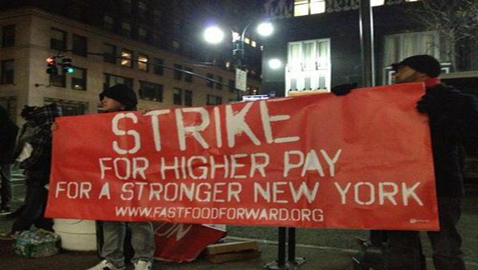Fast Food Workers Say They’ve Been Exploited For Too Long: Demand Higher Pay And Better Working Conditions
Post Views 1
The striking employees are asking to be allowed to organize under unions and to be paid at least $15 an hour from the current $8.90 an hour that they make in New York City.
Columbia professor Liza Featherstone, an expert on labor issues said that low wage services and retail organizing were on the increase. Not only Walmart and now New York were witness to labor problems but quite a few others service and retail businesses had to bear the brunt of labor action. The young brigade at food joints are becoming increasingly confrontational and earlier this week workers at “Hot and Crusty” signed their first union contract.
Analysts say that these industries are playing a key role, if not the foremost role in the US economy and all of them use low-cost labor that is easily available. Featherstone said that these jobs are similar to what manufacturing jobs used to be.
With manufacturing jobs losing their allure and most of the manufacturing jobs going overseas, they have declined significantly. On the contrary, jobs in the service sector have escalated. But most of these jobs are very demanding; they don’t pay too much and are almost totally devoid of benefits.
The Bureau of Labor Statistics rates fast food work as the lowest paying employment activity in the US. At the median salary, a fast food worker barely manages to stay above the federal poverty line.
Labor journalist Sarah Jaffe, opines that it was easy for the strike organizers to convince the workers to protest given their near-penury state. Investigations found that most workers could not afford to pay for even such basics as food, accommodation or even a Metrocard to take then to and fro their place of work.
Featherstone felt that the recession was where it all began. Employers exploited the workers and tried to extract more and more work from the workers whilst lessening their wages – the wound that was festering suddenly came to the fore and led to the recent spate of confrontational protests. Earlier workers would rather shift to a new place of work rather than take on their stronger placed employers. This time they risked retaliation but felt they have to make their voices heard.
Companies that were not making money or making less than what they were making earlier cut down on expenses and the first to face their axe were the workers.
At McDonald’s, Domino’s, Wendy’s and other restaurants workers vociferously protested that the low wages were keeping them poor. The strikers said that they have suffered enough and hoped that this strike would allow their employers to see reason and bring them respite from their constant drifting from one job to another. Moreover, the franchise-operated structure prevented unionization and made collective bargaining tricky as the big-guns used this legal loophole to make themselves immune from legal actions and from being esaccountable to the workers.
Union leaders said that the strikers are not trying to influence changes at individual franchisees but were looking to make sweeping change across the broad spectrum and set better more human standards across the entire industry.
Fast Food Workers Say They’ve Been Exploited For Too Long: Demand Higher Pay And Better Working Conditions by Harrison Barnes


 The Most Popular 20 Employer Articles for Gig in 2015
The Most Popular 20 Employer Articles for Gig in 2015  10 Ways to Improve Employee Retention to Reduce Costs
10 Ways to Improve Employee Retention to Reduce Costs  How to Deal with These 5 Types of Toxic Employees
How to Deal with These 5 Types of Toxic Employees  CEO of Small Startup Lets Employees Vote for Management
CEO of Small Startup Lets Employees Vote for Management  Overwhelmed at Work? 7 Simple Strategies to Make Things Better
Overwhelmed at Work? 7 Simple Strategies to Make Things Better  Create a Workplace That Everyone Wants to Be a Part Of
Create a Workplace That Everyone Wants to Be a Part Of  What’s Lacking in the Work Place
What’s Lacking in the Work Place  Employee Horror Stories: Advice for Managers
Employee Horror Stories: Advice for Managers